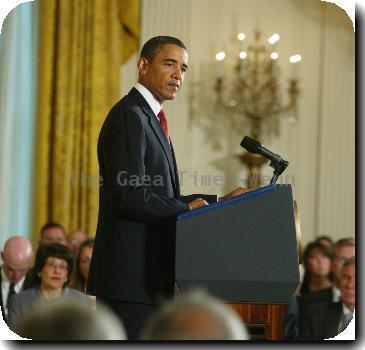Video shows militants training at camp in western Indonesia that was raided last week
By Niniek Karmini, APTuesday, March 16, 2010
Indonesian militants recruit fighters in video
BANDA ACEH, Indonesia — From the safety of a forest camp, a commander of a new Indonesian militant group looks into a camera and ridicules the notorious extremist group Jemaah Islamiyah: They are not violent enough, come and join us, he shouts, an automatic rifle in one hand.
The emergence of the previously unknown group calling itself al-Qaida in Aceh shows how Southeast Asian militants are adapting even amid a Western-funded crackdown that began following the 2002 Bali nightclub bombings and has taken out scores of top leaders.
The group’s criticism of Jemaah Islamiyah is further evidence of the split in Indonesian extremist networks between militants supporting al-Qaida-style attacks inside the country and those who believe such attacks hurt the longer-term aim of establishing a Muslim state in Southeast Asia.
The speech is contained on a 75-minute training, recruitment and propaganda video obtained by The Associated Press from a person not affiliated with the militant group. It contains scenes of about 15 militants exercising on monkey bars, shooting automatic weapons and preaching in a makeshift camp in the western province of Aceh that was raided last month by anti-terrorist police.
It is interspersed with old clips of Osama bin Laden urging violent jihad, or holy war, and scenes of the men eating fish and rice together from a communal pot, chanting as they march through the camp and bathing in a river.
Part or all of the video briefly appeared on a militant-linked blog on the Internet, released by the militants soon after the camp was raided, the first documented case of a terrorist training camp in Indonesia for five years. Two short clips are currently available on YouTube.
“To all those in JI, I tell you. You don’t fight jihad with the pen or in a prayer cap and sarong,” said the commander in a hoarse voice as he sat cross-legged under a canvas sheet. “No, you fight jihad with weapons. Before your hair goes gray with age, join us!”
The commander’s face, along with those of other people in the video, are blurred by an editor. At one point, a militant tells the cameraman to avoid showing the men for the same reason.
Despite the name, it is far from clear whether the new group has direct links to al-Qaida or took the name as a mark of allegiance. In the past, bin Laden’s network has funded attacks in Indonesia, and in the 1990s hosted scores of militants at camps in Afghanistan. Most analysts have said such contacts have ended.
Rita Katz, head of the US-based SITE Intelligence Group that monitors Islamic militant messages online, said al-Qaida in Aceh “looks pretty new.”
Katz said SITE has not seen any evidence the group has a connection to al-Qaida. However, “the group’s propaganda clearly shows that they have been inspired and motivated by bin Laden’s ideology, as they repeatedly used quotes from his speeches in their release,” she said.
The raid on the Aceh camp was followed by a series of arrests and shootings by police across Indonesia. The biggest catch has been Dulmatin, Southeast Asia’s most-wanted terrorist and a master bomb-maker, who was killed last week in an Internet cafe near Jakarta.
The United States had posted a $10 million reward for his death or capture, reflecting the importance Washington places on battling terrorism in Southeast Asia as part of its larger goal of defeating al-Qaida worldwide.
The flurry of activity comes ahead of President Barack Obama’s first trip to Indonesia since taking office. He is due to arrive next week, and the Muslim country’s efforts to battle militants who were behind a string of attacks, including twin hotel bombings last year in Jakarta, are sure to be on the agenda.
Last week, an AP reporter visited the site of the camp seen in the video in Aceh, although there was little remaining, aside from a canvas tent and a plastic bag hanging from a tree. The site lies in deep forest and high in the hills, about a two-hour walk from the nearest village.
It is unknown why the terrorists chose Aceh, which was hard hit by the 2004 earthquake and tsunami, for a base. Until a peace deal in 2005, it was home to a separatist army which, while made up of Muslims, was wholly secular in orientation.
The video contains news media footage of Indonesian police attacking the separatists in that conflict, as well as news footage of Muslim-Christian fighting in eastern Indonesia between 1998 and 2005 that radicalized a generation of Indonesian Muslims.
That juxtaposition suggests the group may be trying to recruit former separatists, who would be especially valuable because of their battle skills and knowledge of the terrain. At one point in the video, a militant from Aceh sings a song in the local language praising jihadists.
Ansyaad Mbai, the top anti-terrorism official at the Coordinating Ministry for Security and Political Affairs, said the group was attracted to Aceh because of its history of conflict, availability of weapons and its location across the Malacca Strait from southern Thailand, another militant hotspot.
Militants in recent months have come to Aceh and have used a legal Islamist group called the Islamic Defenders Front as a cover for their activities, said Yusuf al Qardhawi, the head of the hard-line organization. The front, which is tolerated by security forces because it has no known terrorist connections, promotes Islamic law in Indonesia and is best-known for vandalizing nightclubs in Jakarta.
In January 2009, Qardhawi said his group appealed in the media for volunteers in Aceh to go to Gaza to fight Israeli forces. The group has done this in other regions of Indonesia, and it was generally regarded as a publicity stunt, with no militants actually going to the Middle East.
Qardhawi said more than 150 young people from Aceh responded to the call, adding that he was introduced to a prospective trainer named Sofyan Atsauri, who police now say is an Afghan-trained militant who lived among Islamic militants in the southern Philippines.
Qardhawi said he did not know Atsauri’s background or intentions, and when the Gaza trip failed to happen, he said Atsauri took some of those recruits, along with others from Indonesia’s main island of Java, for training in the forest camp.
“They (Al-Qaida in Aceh) were looking for militant seeds in Aceh,” Qardhawi told the AP. “It was an opportunity for them to get in to the province.”
Qardhawi’s account was largely confirmed by an Indonesian anti-terrorism officer who spoke on condition of anonymity because he is not permitted to talk to the media.
The officer said other militants believed to have been at the camp included a suspect in the 2004 bombing at the Australian Embassy in Jakarta; two other veterans of the campaign in the southern Philippines; and others recruited by known terrorists, including one who was released from prison.
The split in militant ranks in Indonesia has been apparent since the 2002 Bali bombings, which were carried out by members of Jemaah Islamiyah and killed 202 people, mostly Westerners. It is unclear whether the leadership of the group, which was formed by veterans of the Afghan war, ordered or were even aware of the bombings.
The commander in the militant video even singles out a Jemaah Islamiyah leader by name, Abu Rusdan. He says Rusdan should not be trusted because all he does is sit in “an office.”
Rusdan, an Afghan veteran sentenced to 3½ years in jail in 2003 for sheltering a terrorist, is known to be a more moderate member of Jemaah Islamiyah.
While the resilience of jihadist networks in Indonesia has surprised some, given the apparent success of the country’s security forces in capturing or killing militant leaders, analysts have pointed out such movements have deep roots in the country. Jemaah Islamiyah itself is an offshoot of the Darul Islam network, which fought the Indonesian army in the 1960s during its campaign to establish an Islamic state.
Karmini reported from Banda Aceh; Brummitt from Jakarta. Associated Press Writer Christine Simmons in Washington contributed to this report.
Tags: Aceh, Asia, Bali, Banda Aceh, Barack Obama, Bombings, Gaza Strip, Indonesia, Jakarta, Java, Middle East, National Security, Palestinian Territories, Religious Strife, Southeast Asia, Sumatra, Terrorism, Veterans, Violent Crime, Youtube





